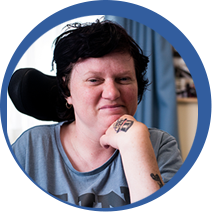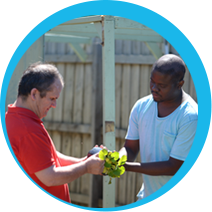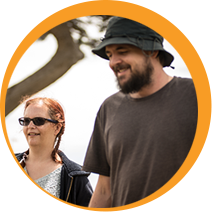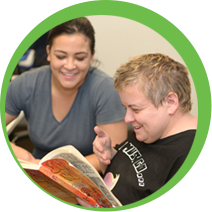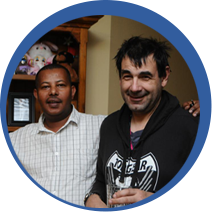ABOUT THE NDIS
The National Disability Insurance Scheme (NDIS) is an insurance-based funding scheme managed by the National Disability Insurance Agency (NDIA). The NDIS is designed to help people with a disability access the supports they need to live a full life.
Gellibrand is a registered provider under the NDIS. We value the unique goals and pursuits of every participant by endeavouring to explore new ideas and services suited to your individual needs and aspirations.
So even if you cannot see exactly what you’re looking for listed in our services, we are excited to listen and form a genuine partnership designed to support you in living life your way.
Call our NDIS line directly at 9300 5491 to speak with one of our intake coordinators and see what we can do for you.
View our NDIS FAQ or scroll down.
If you are new to the NDIS, learn more about the pre-planning support we offer here.
Want more information?
Visit the NDIS Website or give them a call at 1800 800 110.
My NDIS Pathway
NDIS Victoria
NDIS Contact Page
NDIS Frequently Asked Questions
As with most new things, it can be intimidating and confusing trying to understand everything and then knowing where to go next. To help we’ve compiled answers to some of the common questions people have been having about the NDIS.
Our FAQ has been broken up into 5 steps intended to help you understand your journey to the NDIS from start to finish.
- Establishing NDIS eligibility and first contact.
- Preparation and pre-planning.
- Your NDIS planning meeting.
- Implementing your NDIS plan.
- Reviewing and appealing your plan.
ABOUT THE NDIS
What is the NDIS?
The National Disability Insurance Scheme (NDIS) is a relatively new funding reform created in 2013 by the Australian government to better provide support for people with a permanent and significant disability under the age of 65. The NDIS is designed to empower people with a disability by giving them greater choice and control over the supports they need to live an ordinary life.
The NDIS takes a lifetime approach by investing in people with a disability early to improve their outcomes later in life. The NDIS will help these individuals to achieve their goals which may include greater independence, community involvement, employment, and improved wellbeing.
The NDIS also provides people with a disability and their families and carers with information and referrals to existing support services in the community.
If you would like to contact the NDIS:
Phone: 1800 800 110 (8.00am to 8.00pm Monday to Friday)
Website: www.ndis.gov.au
Email: enquiries@ndis.gov.au
TTY users Phone: 1800 555 677 then ask for 1800 800 110
Why are we transitioning into the NDIS?
The NDIS will eventually completely replace and transition everyone from the existing block funding system provided under the National Disability Agreement (NDA). By moving to a social insurance-based model it will allow for a more equitable, efficient, and sustainable system.
The objectives of the NDIS include:
- supporting the independence and social and economic participation of people with disability
- providing reasonable and necessary supports, including early intervention supports, for participants
- enabling people with disability to exercise choice and control in the pursuit of their goals and the planning and delivery of their supports
- facilitating the development of a nationally consistent approach to the access to, and the planning and funding of, supports for people with disability and
- Promoting the provision of high-quality and innovative supports to people with disability.
What is the NDIA?
The National Disability Insurance Agency (NDIA) is the independent agency responsible for implementing the NDIS. Their key function is to manage, provide information, develop and analyse the NDIS to remain financially viable and effective in providing a better life for Australians with a disability.
What will happen to my current supports?
The NDIS operates on a “no disadvantage” principle meaning that any participant entering the NDIS will not be worse off. So if you are currently receiving supports you will not lose those supports under the NDIS.
It will be important to understand the current level of supports you are currently receiving in order to discuss these during your planning meeting.
STEP 1: ESTABLISHING NDIS ELIGIBILITY AND FIRST NDIS CONTACT.
Am I eligible?
- Have a permanent disability that significantly affects their ability to take part in everyday activities;
- Be aged less than 65 when they first enter the NDIS;
- Be an Australian citizen or hold a permanent visa or a Protected Special Category visa; and
- Live in Australia where the NDIS is available.
To find out if you are eligible for NDIS funding you can use an online tool called the NDIS Access Checklist. This tool will help you assess your eligibility by asking specific questions.
What if I am not eligible?
What if I am not eligible because I am over 65?
However, if you are 65 years or older and currently receiving disability services, your services will continue under a program called Continuity of Support which operates under the “no disadvantage principle.”
If you turn 65 years after you have become an NDIS participant you will have a choice. You can either continue to receive disability supports in the NDIS or receive supports through the Commonwealth aged care system.
How do I apply for the NDIS?
All future participants will have to complete an eligibility process but this will be easier for individuals already receiving support. You can begin preparing by collecting information from past eligibility and planning processes.
Not receiving funded support: If you are not currently receiving funded support, have completed the NDIS Access Checklist, and think you may be eligible, you can contact the NDIA when the NDIS becomes available in your area.
The NDIA may require you to provide some more information to further establish your eligibility. This could include information about your primary disability and how it affects your everyday actions.
For more information, you can visit the completing your access request help page on the NDIS website.
STEP 2: PREPARATION AND PRE-PLANNING.
What is an NDIS plan?
An NDIS plan is the outcome of your planning session with an NDIS planner. It outlines your individual goals and the “reasonable and necessary” supports needed to meet those goals. These plans are based on each individual’s support needs. There are no set package amounts and plans are not based on your means or ability to pay for supports.
These NDIS plans are designed to invest and support participants to be as independent as possible, reducing their need for supports over time. Your funding may change every time you plan depending on what you include.
How do I prepare for my plan?
It is important for you to sit down and think about your goals and supports before your scheduled planning session. This will allow you to get the most out of your plan by having a better understanding of your needs. You may decide to discuss these questions with other people you trust such as your family, friends, carers or an advocate. In the broadest sense you should think about:
- What am I currently doing?
- What do I want to do?
- What is important to me?
Gellibrand has a pre-planning workbook that will assist you in preparing and gathering the important information you will need before your planning session. Remember that there are no right or wrong answers for this workbook, it is just meant to be used a starting point.
You can download our pre-planning workbook by clicking here
What supports can I get?
Broadly speaking the NDIS funds supports that fall under three categories:
- Capital Funding: funding for purchasing one off items such as equipment, technology or modifications
- Core Funding: funding for support with day to day activities such as personal care.
- Capacity Funding: funding for skill building, education, learning and training.
The NDIS provides support under those categories when they are deemed “reasonable and necessary.” This can include supports intended to assist in areas such as education, employment, social participation, independence and health and wellbeing. More specifically these supports and services may include:
- Support with daily personal activities.
- Transport to help you participate in community, social, economic and daily life activities.
- Help with employment to successfully get or keep a job.
- Therapeutic supports such as behaviour support and speech therapy.
- Help with household tasks to allow you to maintain your home.
- Aides or equipment to help you live more independently such as assessment, set up and training
- Home modifications including design and construction.
- Mobility equipment.
- Vehicle modifications.
There are certain areas of support that will not be funded by the NDIS. Support items will not be funded if it:
- Is not related to the participants’ disability.
- Duplicates other supports already funded by a different mechanism through the NDIS.
- Relates to day-to-day living costs that are not related to a participant’s support needs.
- Is likely to cause harm to the participant or pose a risk to others.
What is meant by reasonable and necessary?
- Be related to the participant’s disability.
- Not include day-to-day living costs that are not related to a participant’s disability support needs.
- Represent value for money.
- Be likely to be effective and beneficial to the participant.
- Take into account informal supports given to participants by families, carers, networks, and the community.
STEP 3: YOUR NDIS PLANNING MEETING.
What can I expect during my planning meeting?
You will work with your planner to organise a place and time that is convenient for you to discuss your plan. These meetings are intended to be face-to-face and you can request to meet at an NDIS or LAC office. While it is not recommended, your meeting can be conducted over the phone if no other option is available.
Your planner will want to know more about you to help them understand and individualise a plan suited to your needs. This meeting will essentially be a conversation about your life. To assist you in preparing for this conversation you can download our preplanning workbook by clicking here: Download our pre-planning workbook (PDF).
A typical planning meeting agenda will look something like this:
Introductions: Your planner will introduce themselves and outline what you will talk about in the meeting.
Your participant statement: Your planner will ask you a bunch of questions to better understand your support needs and goals. This includes things such as: your current situation: living arrangements, social activities, employment, current supports, and what is working well. They will also discuss your goals / aspirations and what you would like to change.
Setting your objectives: You and your planner will turn your goals and aspirations into a set of actions. Developing strategies: Your planner will help develop the steps you need to take to achieve your goals and aspirations.
Measuring your achievements: You will discuss how you and your planner will be able to tell if your personal plan is working.
Managing your plan: Your planner will talk to you about options for managing your plan. See below for more information.
Setting review dates: You and your planner will agree on review dates for your plan.
Extra Steps: A second meeting may be required to finish your planning conversation. If this is the case, you will agree upon a time.
There may also be a need to conduct a specialist assessment. This is an exam that a specialist such as a doctor or a therapist will conduct in order to make sure are getting the right supports to meet your needs. Your planner will help you understand why you need it, how it will be conducted and what information it will give the NDIS.
Your planner will use the information gathering during your planning meeting to determine which supports will best help you meet your needs and achieve your goals.
How long will my meeting take?
The time required for a planning meeting will be different for each person. It may only take one meeting or you may require a second one. Your planner will take the needed time to talk through what is important to you and help you make decisions.
Can I bring someone to my planning meeting?
Yes, if you wish to, you may bring someone to support you during the planning meeting. This may be a friend, family member, carer, or an advocate. Consider asking someone who knows about all the parts of your life and needs, this may mean someone outside of your service providers.
If you have a carer, they may wish to make a statement about the support they provide. If this is the case, your planner will ask you for your permission.
You may also request for a translator to be present during your planning meeting.
What should I bring to my planning meeting?
It is important to come prepared for you planning meeting. This means bringing the relevant documentation to help support you and provide your planner with the correct information. This may include items such as [a pre-planning workbook], a list of current supports, your goals, your Person Centred Plan (PCP), Health Support Plan, Behaviour Support Plan, letters from your doctor or therapist, current day program schedules, information about recreational or social programs, information about your family, information about your needs at work or school and recreational program information.
How can I manage my plans funding? (Plan Management)
Your planner will likely ask you how you would like to manage the funding that will be allocated in your plan. There are 5 options for you to for to choose from about how you like your plan managed:
- Self-Managed: You can manage your funding independently. The NDIS will allocate the funding to you so that you can organise and pay for your own supports.
- Plan Nominee: You can nominate another person to manage your funding. They are called a “plan nominee.”
- Registered Plan Management Provider: You can get a registered organisation such as a financial intermediary to manage your funds for you.
- NDIA Managed: You can get the NDIA to manage your funding for you.
- Combination: You can use a combination of the management options listed above.
Whatever you decide, your planner can help find and arrange the best option for you.
What if I need help finding and organising service providers? (Support Coordination)
Depending on your situation, you may be funded for support coordination if it is deemed reasonable and necessary. Support coordination allows you to choose a service provider like Gellibrand to help you organise the supports outlined in your NDIS plan. If this is the case, your planner will ask you which service provider you would like to assist you or help you find one. You can find more information about Support Coordination on the NDIS website
STEP 4: IMPLEMENTING YOUR NDIS PLAN.
I just finished my planning meeting, what happens next?
After your planning meeting, your planner will take the details of your conversation and compile that into a plan. Your planner will then send you a copy of your approved plan to review and sign.
I just received my plan, now what?
It is important that you start to use your plan as soon as you receive it because your previous non-NDIS funding will cease upon approval. The first concrete steps to implementing your plan will be to go online and set up the NDIS participant portal called “myplace.” Myplace is a secure website for participants or their nominees to view their NDIS plan, request payments and manage services with providers.
You will need a myGov account to access the myplace portal. You will receive a letter with your plan that will contain an activation code to myplace. Make sure that you log in as soon as possible as your activation code will expire within 10 days.
You can find a link to the portal at the top of the NDIS page or logging in through the myGov website. Once you are set up in the portal you can begin contacting service providers to meet your support needs. If you would like to keep your existing provider, you will have to contact them and let them know about your approved NDIS plan so they can set up a Service Agreement.
Click here for more information about how to use the NDIS Participant Portal
How do I find a service provider?
If you have support coordination in your plan, this is where they can support you to find registered supports and services as well as provide you with ongoing support about the NDIS in this area. You can also contact a LAC to assist you with choosing a service provider should you require.
What happens after I have chosen a service provider?
You will have to sign a Service Agreement with your provider. This will outline all of the details regarding how your support will be delivered.
STEP 5: REVIEWING AND APPEALING YOUR PLAN
What if I don’t like the support provider that I chose?
The NDIS is committed to empowering participants with choice and control. This means you can choose which provider delivers your support. You will likely have to consult the Service Agreement that was negotiated with your current provider as it may include how to change providers or cease services. You will be responsible for finding and engaging an alternative service or talking to the NDIS about changing your plan.
Participants are responsible for informing providers about any changes to their plan when their plan is reviewed when they want more or less service when they want to stop support or change how that support is delivered.
How does the NDIS affect primary carers?
To find out more information about the support available to carers, you can visit this NDIS website.
How long does my NDIS plan last?
An NDIS plan is in effect for 12 months.
You will be contacted to organise a review of your plan and goals for the next year around six weeks before your current plan expires.
You can request an early review by contacting your planner if something significant happens in your life to change the levels of support you need.
What if I am not happy with the supports I received from my provider?
For disability services – The Disability Services Commissioner For mental health services – The Mental Health Complaints Commissioner For health services – The Heath Complaints Commissioner For other services – Consumer Affairs Victoria The Disability Services Commissioner will be able to assist you if you are unsure about who to contact when making a complaint.
What if I am not happy with my support plan or a decision made by the NDIS?
You can also go through the NDIA’s internal review process. You can find out more information about how to review a decision by visiting this page on the NDIS website.
What if I am not happy with my support plan or a decision made by the NDIS?
The NDIA states in its complaints process that they will contact you within 2 days of receiving the complaint and aim to resolve complaints within 21 business days. If you have followed this process and are still dissatisfied with the outcome, you can ask for a supervisor or manager to review your complaint and how it was handled.
If you are still dissatisfied after a review by a manager you can contact the Commonwealth Ombudsman for further assistance. The Commonwealth Ombudsman can be contacted by calling 1 300 362 07 or vising the Making a Complaint page on their website.
Alternatively, you may also contact Disability Services Commissioner by visiting their website.
Still have questions? Don’t hesitate to contact us to see how we can help.
